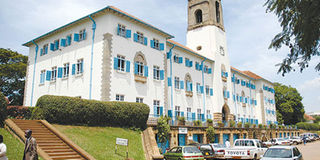Makerere goes to parliament over Shs130 billion debt

Makerere university main building. File photo
Kampala: As the Ministry of Education and Sports seeks Parliament to pass its over Shs2 trillion budget, one of the unfunded priorities is Makerere University’s Shs130b debt.
According to information in the ministry’s policy statement, the university’s indebtedness rose from Shs85 billion in the financial year 2014/15 to Shs130 billion in 2015/16.
The money is owed to retirees’ pension and in-house retirement benefits, staff/part-timers and suppliers.
Indebtedness is on one of the main challenges the university highlights and seeks Parliament’s intervention as they allocate resources for the next financial year.
“The institution’s growing indebtedness to retired staff/or pensioners, serving full-time and part-time staff, suppliers of goods and services all of which have accumulated over the years.
Loss of many of the court cases relating this indebtedness threatens to escalate the litigation costs to the university,” the policy statement reads in part.
It adds, “The University’s governing council appeals to government to fully take over the enhanced wage bill to which it continues to top up UShs.2bn per month from internally generated funds. The Government of Uganda should fully cover the enhanced and harmonized wage/salaries for Makerere University like it does for all the other public universities for both teaching and non-teaching staff.”
The university also thinks it has a toothless governing council and says it is affecting operations.
“The 'public-private mix' with a powerless governing council which for instance cannot freely take and implement timely decisions on critical issues such as periodic review of the unrealistic fees/or tuition paid by the majority private students which is far below the unit cost of producing a quality graduate,” the university notes.
For the next financial year, the university has been allocated shs235billion of which Shs109 billion will go to wages.
Because of lack of enough funds, the university also suffers a problem of understaffing with most understaffed colleges being below 50 per cent.
These are College of Business and Management Sciences at 25 %, College of Computing and Information Sciences with 31 % and College of Engineering, Design Art and Technology with 49 %.
“This level of under staffing not only affects teaching but also the research and supervision of graduate training,” the ministry of education argues in the policy statement. “Beefing up Staffing levels of the four colleges to a level of at least 50 % is estimated at shs9.4bn.”




